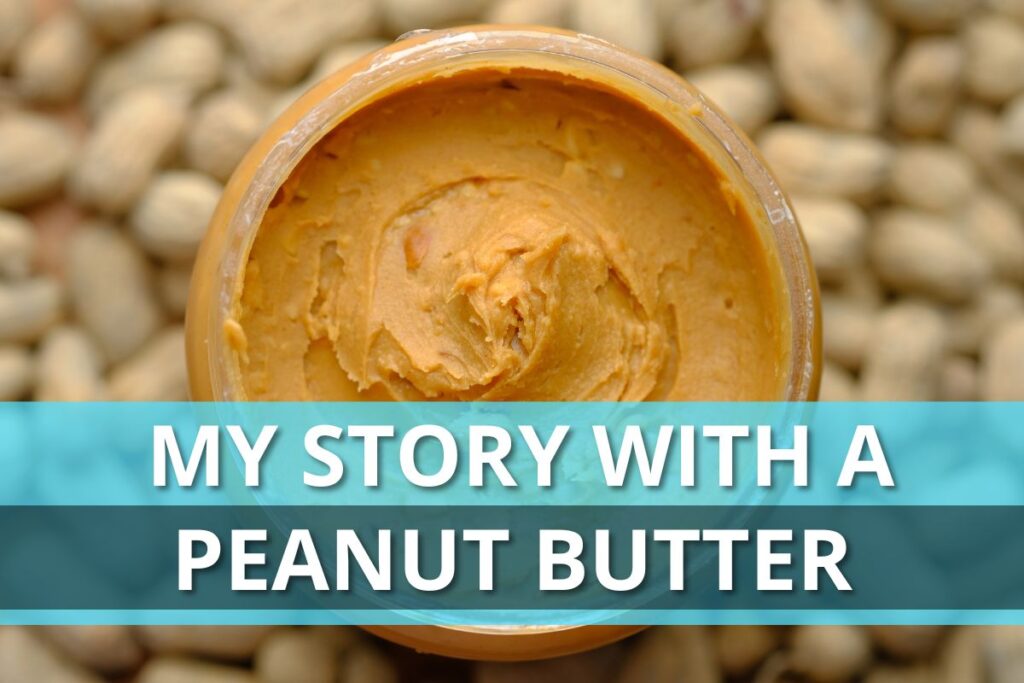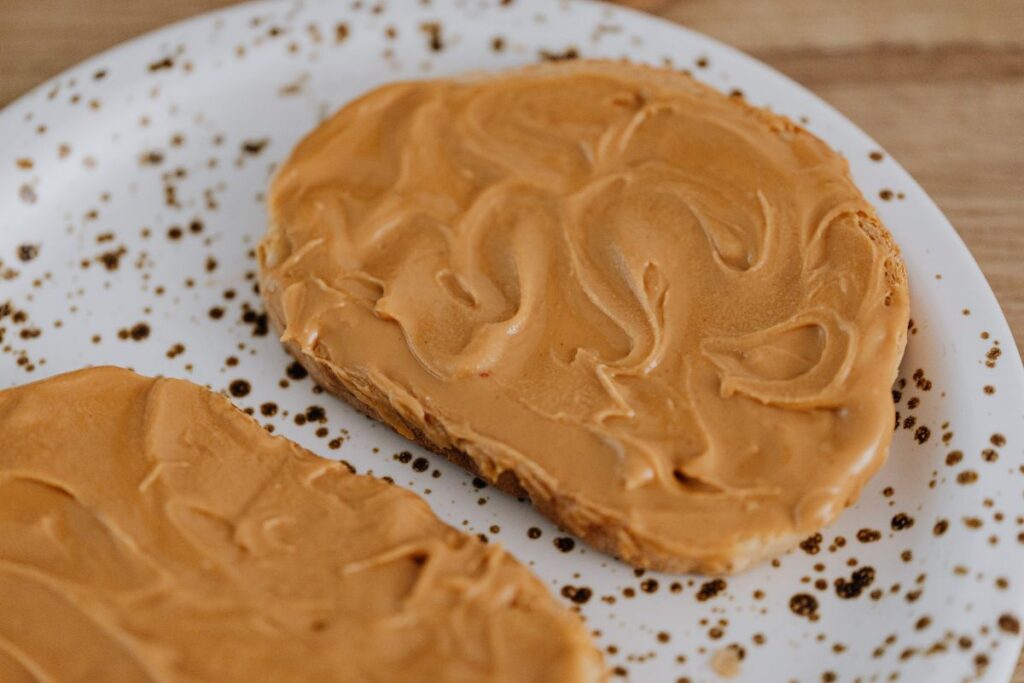My Story With A Peanut Butter
Author:
Unlock your full potential by engaging with our experts and community! Have questions about your fitness journey or looking for expert advice on weightlifting techniques? Don’t hesitate — leave a comment below and Sergii Putsov will provide a personalized answer and insights to help you reach your goals.
Torokhtiy is reader-supported. Some links are affiliate links, and we may earn a commission at no extra cost to you. See our disclosure page for details.

Recently I was asked a very interesting question – if I had to give up all products, but leave only one, what would I choose? For a long time, I did not hesitate and immediately named peanut butter.
Several years ago, I set myself a goal of gaining 2-3 kg of muscle mass. And for this, of course, I had to increase my calorie intake. However, the task was not easy for several reasons:
- I was already a big guy and ate a lot, so I didn’t want to eat even more grains, fruits, and protein foods.
- I didn’t want to add more calories with sweets and junk food.
- I wanted to make my usual diet more delicious.
As you may have guessed, it was peanut butter that came to my rescue. Next, I will tell you what this wonderful product is rich in, how much you can eat and how to choose the right one.
Nutrients in Peanut Butter
Just 1 rounded teaspoon of peanut butter (15 g) equals approximately 90 calories. In comparison, two medium-sized kiwis, one large orange, or a slice of bread contain the same amount of calories. At the same time, in terms of volume, peanut butter takes up much less space – due to the high density of calories. 100 g of peanut butter without additives (honey, sugar, chocolate) contains about 597 kcal. It is a practical, ideal calorie-boosting product if you are already eating a lot.
You may like it:
Peanut butter contains all 3 macronutrients: protein, fat and carbohydrates. One teaspoon contains 8 g of fat, 3.5 g of protein, and 3.5 g of carbohydrates. That is, when you add peanut butter to your diet, you increase the calories from all macronutrients. You get both a few grams of protein, which is good for muscle, and a few grams of carbohydrates, which is good for your performance. An added health bonus is almost 1 gram of fiber. Agree, very good for such a small portion.
A big advantage of peanut butter is that half of the fat in this product is monounsaturated. They have a neutral positive effect on health, in contrast to the excess of polyunsaturated omega-6 fats and saturated fats, which are much less in peanut butter without additives.

Just one teaspoon of peanut butter contains many vitamins and minerals:
- 7% of the daily allowance for copper and phosphorus;
- 6% magnesium;
- 3% zinc;
- 2% of the norm of potassium;
- 6% vitamin E;
- 12% vitamin B3;
- 5% vitamin B6;
- 3% vitamin B9;
- 2% of the norm of vitamins B1 and B2.
If you take 2 teaspoons of butter a day, there will be even more nutrients. True, the calorie content of such a portion will be much larger, you need to take this into account.
A separate advantage of peanut butter is its taste. Many of us can go completely without sweets and junk food, as long as we do not have peanut butter taken from them. Flavor and texture are also hallmarks of peanut butter.
How much to eat and how to choose the right peanut butter?
If your goal is to increase calorie intake and gain muscle mass, then 1-2 servings of 1 tsp. peanut butter per day will help you get an additional 90-180 kcal from 8-16 g of fat, 3.5-7 g of protein and carbohydrates. This is a very easy way to increase calorie intake, especially for those who eat a lot but are still gaining weight.
If you’re looking to lower your fat percentage, then you need to be careful with portion sizes. Don’t forget that peanut butter is one of the most nutritious foods around. Only nuts, some varieties of seeds, as well as butter and vegetable oils like olive, flaxseed, and others have more calories per 100 g.
On the other hand, peanut butter is quite satiating, and its inclusion in the diet for weight loss makes it easier to endure the period of restrictions.
Finally, I’ll show you how to choose the right peanut butter. You don’t need to be an expert to do this. When choosing, always pay attention to a paste that contains only peanuts. Ideally, buy pasta without salt, but this is not necessary, because a little salt makes this product tastier.
I do not recommend buying a paste that contains sugar, chocolate, honey, vegetable oil, and especially partially hydrogenated fat (trans fats, partially hydrogenated oil). All this only increases the calorie content of the final product, and partially hydrogenated fat has a very bad effect on health, even in small quantities. Buy classic pasta without additives and enjoy its excellent taste.
Related articles:
You might be interested in:
Why Trust Us?
With over 20 years in Olympic weightlifting, strength training, nutrition coaching, and general fitness our team does its best to provide the audience with ultimate support and meet the needs and requirements of advanced athletes and professional lifters, as well as people who strive to open new opportunities and develop their physical capabilities with us.
By trusting the recommendations of our certified experts in coaching, nutrition, and sports training programming, as well as scientific consultants, and physiotherapists, we provide you with thorough, well-considered, and scientifically proven content. All the information given in the articles concerning workout programming, separate exercises, and athletic performance, in general, is based on verified data.
The product testing process is described in more detail here.
Author: Sergii Putsov
Head of Sport Science, PhD
Best Results: Snatch – 165 kg,
C&J – 200 kg
Sergii Putsov, Ph.D., is a former professional weightlifter and National team member, achieving multiple medals in the 94 kg weight category at national competitions. With a Master’s degree in “Olympic & Professional Sport Training” and a Sport Science Ph.D. from the International Olympic Academy, Greece, Sergii now leads as the Head of Sport Science. He specializes in designing training programs, writing insightful blog articles, providing live commentary at international weightlifting events, and conducting educational seminars worldwide alongside Olympic weightlifting expert Oleksiy Torokhtiy.




Still have questions after reading our article? Unlock your full potential by engaging with our experts and community! Don’t hesitate — leave a comment below and Sergii Putsov will provide a personalized answer and insights to help you reach your goals.